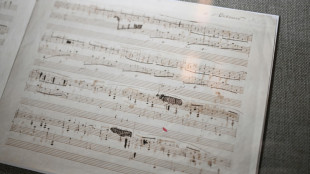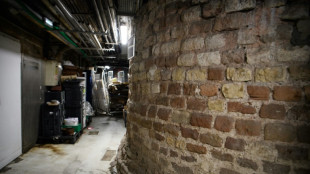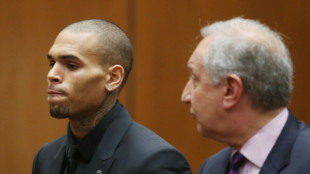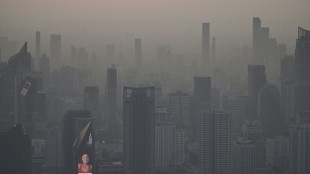
-
 Progressive politics and nepo 'babies': five Oscar takeaways
Progressive politics and nepo 'babies': five Oscar takeaways
-
American Airlines shares fall on lackluster 2025 profit outlook

-
 Sudan's army, paramilitaries trade blame over oil refinery attack
Sudan's army, paramilitaries trade blame over oil refinery attack
-
France to introduce new sex education guidelines in schools

-
 'Brave' Keys deserves to be in Melbourne final, says Swiatek
'Brave' Keys deserves to be in Melbourne final, says Swiatek
-
'Shattered souls': tears as horror of stabbing spree retold at UK court

-
 'Emilia Perez' lauded in Hollywood but criticized in Mexico
'Emilia Perez' lauded in Hollywood but criticized in Mexico
-
Bayern's Davies ruled out 'for time being' with hamstring tear

-
 Poland says purchased rare 'treasure' Chopin manuscript
Poland says purchased rare 'treasure' Chopin manuscript
-
Calls for calm, Pope on AI, Milei on Musk: What happened at Davos Thursday

-
 Ukraine orders children to evacuate from northeastern towns
Ukraine orders children to evacuate from northeastern towns
-
Hibatullah Akhundzada: Afghanistan's reclusive Taliban leader

-
 Argentina's record points scorer Sanchez retires from rugby
Argentina's record points scorer Sanchez retires from rugby
-
Shiffrin set for World Cup skiing return at Courchevel

-
 'No conversation needed' for Farrell about Lions tour selection
'No conversation needed' for Farrell about Lions tour selection
-
Wall Street's AI-fuelled rally falters

-
 Drinking water in many French cities contaminated: study
Drinking water in many French cities contaminated: study
-
West Africa juntas tighten screws on foreign mining firms

-
 Spain govt to cover full cost of repairing flood-damaged buildings
Spain govt to cover full cost of repairing flood-damaged buildings
-
PSG loan France forward Kolo Muani to Juventus

-
 'Emilia Perez' tops Oscar nominations in fire-hit Hollywood
'Emilia Perez' tops Oscar nominations in fire-hit Hollywood
-
Tears, gasps as UK court hears horrific details of stabbing spree

-
 St Andrews to host 2027 British Open
St Andrews to host 2027 British Open
-
S.African anti-apartheid activists sue govt over lack of justice

-
 Cocaine seizures in Rotterdam down sharply
Cocaine seizures in Rotterdam down sharply
-
Keys shocks Swiatek to set up Sabalenka Australian Open final

-
 Formula One drivers face new sanctions for swearing
Formula One drivers face new sanctions for swearing
-
UK to make case to Trump against whisky tariff: finance minister

-
 After Musk gesture, activists project 'Heil' on Tesla plant
After Musk gesture, activists project 'Heil' on Tesla plant
-
Career-high 54 for Gilgeous-Alexander as Oklahoma City roll Utah

-
 ICC prosecutor seeks arrest of Taliban leaders over persecution of women
ICC prosecutor seeks arrest of Taliban leaders over persecution of women
-
Syria's economy reborn after being freed from Assad

-
 Shoppers unaware as Roman tower lurks under French supermarket
Shoppers unaware as Roman tower lurks under French supermarket
-
PSG finally click and fire warning shot to European rivals

-
 Saudi crown prince promises Trump $600bn trade, investment boost
Saudi crown prince promises Trump $600bn trade, investment boost
-
Unstoppable Sabalenka playing 'PlayStation tennis' says Badosa

-
 Sabalenka to take Badosa shopping after Melbourne rout - and pay
Sabalenka to take Badosa shopping after Melbourne rout - and pay
-
Man City step up rebuild with signing of Marmoush for £59 million

-
 Stocks mainly rise after Wall Street's AI-fuelled rally
Stocks mainly rise after Wall Street's AI-fuelled rally
-
Palestinian official says hundreds leave Jenin as Israel presses raid

-
 Sabalenka beats Badosa to make third straight Australian Open final
Sabalenka beats Badosa to make third straight Australian Open final
-
Singer Chris Brown sues Warner Bros for $500 mn over documentary

-
 J-pop star Nakai to retire after sexual misconduct allegations
J-pop star Nakai to retire after sexual misconduct allegations
-
More than 250 Bangkok schools close over air pollution

-
 Leaky, crowded and hot: Louvre boss slams her own museum
Leaky, crowded and hot: Louvre boss slams her own museum
-
Sabalenka tames Badosa to make third straight Australian Open final

-
 Man City step up rebuild with Marmoush signing
Man City step up rebuild with Marmoush signing
-
Kremlin ready for 'mutually respectful' Trump talks

-
 Negligence played key role in Turkey ski resort deaths: expert
Negligence played key role in Turkey ski resort deaths: expert
-
Celtic cash in on Champions League lifeline offered by new format

| RBGPF | -1.5% | 61.28 | $ | |
| CMSC | -0.3% | 23.42 | $ | |
| AZN | 0.3% | 68.405 | $ | |
| NGG | 0.84% | 60.56 | $ | |
| SCS | -0.3% | 11.545 | $ | |
| GSK | 1.46% | 33.925 | $ | |
| BTI | 1.15% | 36.995 | $ | |
| RIO | 0.02% | 61.13 | $ | |
| RELX | -0.24% | 49.14 | $ | |
| CMSD | -0.52% | 23.835 | $ | |
| JRI | -0.12% | 12.515 | $ | |
| BCE | 0.75% | 23.325 | $ | |
| VOD | 0.42% | 8.415 | $ | |
| RYCEF | 3.2% | 7.51 | $ | |
| BP | 0.5% | 31.285 | $ | |
| BCC | 0.59% | 128.685 | $ |

Syria's economy reborn after being freed from Assad
When Bashar al-Assad ruled Syria, merchants like Youssef Rajab kept much of their imported stock hidden for fear of arrest for breaking the law.
But after an Islamist-led coalition toppled Assad in a lightning offensive last month, Rajab put previously banned foreign goods such as chocolate, biscuits and shampoo back on the shelf.
Such products are now openly on sale in Damascus, and foreign currency is once again traded without fear.
Under Assad, Syria was mired in corruption, under heavy economic sanctions, and in seemingly endless crisis.
Foreign currency was in carefully controlled supply, and engaging in its trade or in the sale of banned goods could have meant a stay in one of the country's notorious jails.
"A day after the regime fell, I brought out all the foreign merchandise I'd been hiding and put it for sale, without having to worry," Rajab told AFP.
"It was a strange feeling, but I was happy," added the 23-year-old, speaking beside shelves stacked with imported products.
Previously, the few imported goods that were available were smuggled in from Lebanon by traders who risked arrest, or were acquired by bribing officials as businessmen controlled imports to a country wracked by 13 years of civil war.
"It's true that now we have great freedom to engage in business, but it has also been chaotic," said Rajab.
On every street corner, makeshift money changers now tout for business from passers-by.
"It's a job that was done in secret before," said Amir Halimeh, sitting at a small table on which there were wads of Syrian pounds and US dollars.
"We used to refer to dollars as 'mint' or 'parsley' or something else green" to bypass surveillance, he added.
- Currency market 'freed' -
Assad's government kept a firm grip on foreign currency dealings as a way to control the economy, and any freelance operators faced punishment of seven years in prison and a heavy fine.
"The market has now been completely freed... as has the exchange rate," the moneychanger said.
The pound lost about 90 percent of its value against the US dollar in 2011, the year Syria descended into civil war after a brutal crackdown on democracy protests.
Now it is being traded at between 11,000 and 12,000 to the greenback.
Before Damascus fell to the coalition led by the Hayat Tahrir al-Sham group, the black market rate soared to 30,000 pounds for one dollar.
"The economy in the future Syria will be free and competitive," the interim government's Economy Minister Bassel Abdel Hanan told reporters.
He said the new authorities would implement "policies aimed at protecting domestic output, supporting the industrial sector and protecting agriculture".
They have yet to elaborate on their future economic plans during the three-month interim phase that began in December.
Economics professor Adnan Suleiman of Damascus University said that "the economic model that existed before the fall of the regime... was a market economy", but a "distorted" one.
- Sanctions -
"Supply and demand were not free. Instead of competition there was a monopoly," he said of people close to Assad who controlled different sectors of the economy.
In an effort to turn the page, the interim government has been lobbying for international sanctions to be lifted.
Earlier this month, the US Treasury Department announced it was providing additional sanctions relief on some activities for the next six months to ease access to basic services, including fuel and humanitarian aid.
Asaad al-Shaibani, Syria's top diplomat, told the World Economic Forum in Davos on Wednesday: "Removing economic sanctions is the key for the stability of Syria."
They had been imposed for the benefit of Syrians, but are now "against the Syrian people", he said.
"We inherited a collapsed state from the Assad regime, there is no economic system," Shaibani said, adding that "the economy in the future will be open".
Under Assad, fuel sales were a monopoly and were severely limited.
But now vendors openly sell cans of petrol and fuel oil on the streets of the capital -- where new models of car have also made an appearance.
Previously, the import of vehicles was tightly regulated.
Syria's war took a terrible toll not only on the people, but also on its infrastructure.
Damage to power plants and pipelines has caused power cuts lasting up to 20 hours a day.
"The former regime left a huge legacy," said Suleiman.
"The greatest task facing future governments is to finance development and reconstruction."
E.Rodriguez--AT
